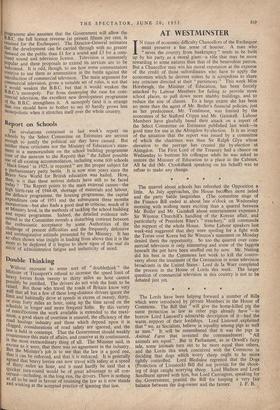AT WESTMINSTER
IN times of economic difficulty Chancellors of the Exchequer must preserve a fine sense of honour. A man who " saves the country from bankruptcy " tends to. be built up by his party as a moral giant—a role that may be more rewarding to some natures than that of the benevolent patron. But a Chancellor may win his moral reputation at the expense of the credit of those subordinates who have to apply the economies which he decrees unless he is scrupulous to share any criticism directed at their " parsimony." This week Miss Horsbrugh, the Minister of Education, has been fiercely attacked by Labour Members for failing to provide more school places, to pull down more shabby buildings, and to reduce the size of classes. To a large extent she has been no more than the agent of Mr. Butler's financial policies, just as her predecessor, Mr. Tomlinson, was limited by the economies of Sir Stafford Cripps and Mr. Gaitskell. Labour Members have gleefully based their attack on a report of. the Select Committee on Estimates published last week—in good time for use in the Abingdon by-election. It is an irony of the situation that the report was issued by a committee of which the chairman was then Sir Ralph Glyn whose elevation to the peerage has created the by-election at Abingdon. The First Lord of the Treasury had a chance on Wednesday to buttress his colleague when he was asked to restore the Minister of Education to a place in the Cabinet. All he did (Mr. Crookshank speaking on his behalf) was to refuse to make any change.
The quarrel about schools has refreshed the Opposition a little. As July approaches, the House becdthes more jaded and the party battle languishes. (The committee stage of the Finance Bill ended at about bne o'clock on Wednesday morning with nothing more exciting than a quarrel between Mr. Butler and Mr. Gaitskell about entertainment expenses.) Sir Winston Churchill's handling of the' Korean affair, and particularly of President Rhee's treachery," still commands the support of the whole House. Some Labour speakers last week-end suggested that they 'were spoiling for a fight with the Tories over Korea but Sir Winston's statement on Monday denied than the opportunity. So too the quarrel over com- mercial television is only simmering and some of the faggots beneath the pot have been snuffed out by now. Mr. Nutting did his best in the Commons last week to kill the contro- versy about the treatment of the Coronation in some television broadcasts in the United States: Lord de la Warr completed the process in the House of Lords this week. The larger question of commercial television in this country is not to be debated just yet.
* a * a The Lords have been helping forward a number of Bills which were introduced by private Members in the House of Commons. The Bill that " will give the home-killed pig the same protection in law as other pigs already have "—to borrow Lord Listowel's admirable description of it—had the warm support of their lordships. Lord Listowel . explained that " we, as Socialists, believe in equality among pigs as well as men." It will be remembered that' it was the pigs in Animal Farm that invented the commandment: All animals are equal." But in Parliament, as in Orwell's fairy tale, some animals turn out to be more equal than others, and the Lords this week concurred with the Commons in deciding that dogs which worry sheep ought to be more tightly controlled. Lord Bledisloe regretted that the Dogs (Protection' of Livestock) Bill did not provide for the shoot- ing of dogs caught worrying sheep. Lord Hudson and Lord Sandhurst agreed with him, but Lord Carrington, speaking for the Government, praised the Bill for keeping a very fair balance between the dog-owner and the farmer. J. F. B. ,


































 Previous page
Previous page